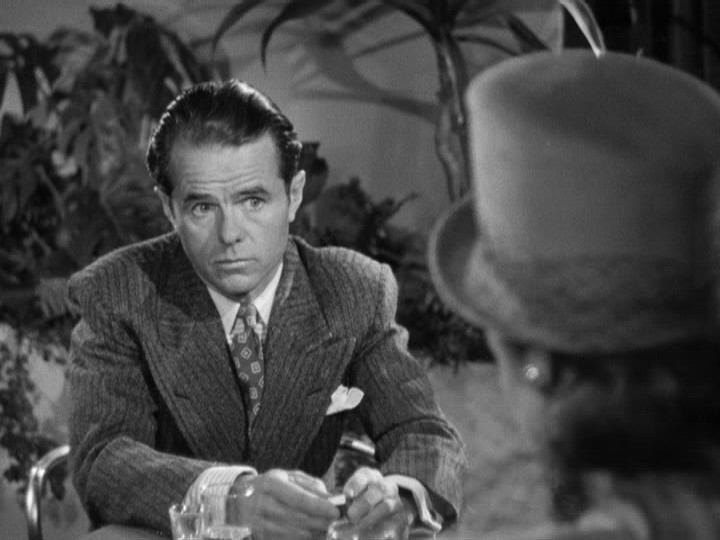 Born to Kill (1947) hardly fulfills its lot: it lives long enough for a double homicide, then promptly turns to hang itself. Its ailment is a confused script: characters that are neither here nor there (though, perhaps if they actually went somewhere the movie might be better). As it stands, the characters seem amorphous, with ill-defined motivations and stock personalities from any number of better hardboiled yarns.
Born to Kill (1947) hardly fulfills its lot: it lives long enough for a double homicide, then promptly turns to hang itself. Its ailment is a confused script: characters that are neither here nor there (though, perhaps if they actually went somewhere the movie might be better). As it stands, the characters seem amorphous, with ill-defined motivations and stock personalities from any number of better hardboiled yarns. The opening ten minutes are the movie’s finest moments. The story begins in a boarding house owned by the elderly, beer-guzzling Mrs. Kraft (Esther Howard), one of those colorful, eccentric personalities that old Hollywood specialized in—and if only there were more characters of this sort in Born to Kill, because most of the rest of the characters are far too serious to be enjoyable. One of the tenants, Laurie Palmer (Isabel Jewell), is two-timing her boyfriend Sam Wilde (Lawrence Tierney), and when he finds out, he murders both her and her other beau. Killing the girlfriend is one of the archetypical noir plots, and Tierney is well suited to this sort of raw violence with his steadfast and unperturbed demeanor. Director Robert Wise films the scene without a hint of melodrama or exaggeration, setting a precedent that is disregarded for the rest of the picture.
 Taking the first train out of town, Sam meets Helen Brent (Claire Trevor). Fate (or coincidence) has thrown them together: unbeknownst to Sam, Helen is Laurie’s roommate who discovered the bodies, but for furtive reasons did not inform the police; and Helen is unaware that Sam is the murderer. This hardboiled match-made-in-heaven meets an early death when Sam discovers Helen is already engaged. In retaliation, he marries her sister. Both relationships begin to disintegrate when Mrs. Kraft appears with a private detective and a determination to bring Laurie’s killer to justice.
Taking the first train out of town, Sam meets Helen Brent (Claire Trevor). Fate (or coincidence) has thrown them together: unbeknownst to Sam, Helen is Laurie’s roommate who discovered the bodies, but for furtive reasons did not inform the police; and Helen is unaware that Sam is the murderer. This hardboiled match-made-in-heaven meets an early death when Sam discovers Helen is already engaged. In retaliation, he marries her sister. Both relationships begin to disintegrate when Mrs. Kraft appears with a private detective and a determination to bring Laurie’s killer to justice. The biggest problem with this story is its lack of focus: the film awkwardly switches gears and is unable to efficiently combine its multitude of conflicts. There is the issue of Sam’s psychosis, which seems to just be the result of a bad temper. Likewise, Helen’s attraction to violence is an unexplained anomaly (it is never sufficiently explained why she doesn’t call the police when she discovers the bodies). Under the surface there is sub-plot about Sam marrying for money, and how Helen is jealous of her sister’s inheritance (of which Helen received none), but like many of the undercurrents in Born to Kill, they are more underdeveloped than subtle.
 My biggest disappointment with the picture, however, is with Elisha Cook, who plays Sam’s confidant Marty Waterman. Cook, with his small frame and whimpering voice, is famous for playing the fish-out-of-water in such noir gems as The Maltese Falcon (1941), The Big Sleep (1946) and The Killing (1956)—a softboiled soul in a hardboiled world—but in Born to Kill he’s so much the softy that it is difficult to believe. When Sam confesses to Marty that he murdered Laurie and her boyfriend, Marty’s concern is so congenial it seems to be in jest but, in actuality, he is being earnest.
My biggest disappointment with the picture, however, is with Elisha Cook, who plays Sam’s confidant Marty Waterman. Cook, with his small frame and whimpering voice, is famous for playing the fish-out-of-water in such noir gems as The Maltese Falcon (1941), The Big Sleep (1946) and The Killing (1956)—a softboiled soul in a hardboiled world—but in Born to Kill he’s so much the softy that it is difficult to believe. When Sam confesses to Marty that he murdered Laurie and her boyfriend, Marty’s concern is so congenial it seems to be in jest but, in actuality, he is being earnest. Versatile director Robert Wise, who early in his career edited Orson Welles’ Citizen Kane (1941) and later went on to direct such classics as The Set-Up (1949) and West Side Story (1961), stoically commands the unsteady script, but seems unable to balance all its deficiencies. The performances are, by and large, professional and convincing (Tierney and Trevor, in particular), and occasionally brilliant (such as Mrs. Kraft, the landlady). Still, Born to Kill lacks the cohesiveness of something like This Gun for Hire (1942), where the script and story is rock steady and can provide a solid foundation for the actors to build upon. Born to Kill, with occasional flashes of excellence, lacks the foundation necessary for consistency.

1 comment:
Cullen, I agree. Born to Kill peaks with double homicide. Things get awfully silly once the action moves from Reno to San Francisco. The last five minutes were a disaster.
Post a Comment